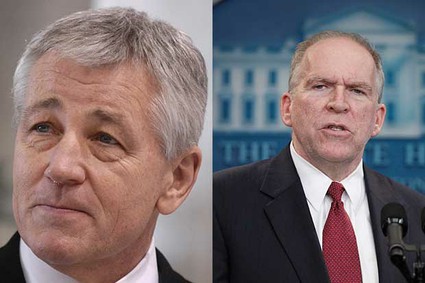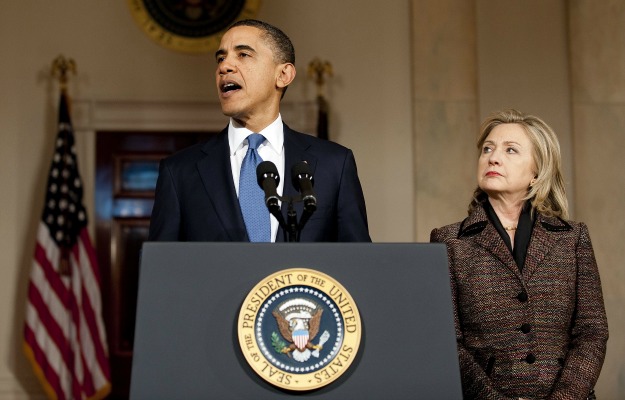Editor’s Note – This is the written text of an address delivered to the Maryland Conservative Action Network Saturday, January 12, 2013 in Annapolis by Diana West
What might a “conservative” foreign policy look like?
By Diana West – American Thinker
In the post-9/11 era, it’s fair to say we have mainly followed a “neoconservative” foreign policy. This policy has been based on the rock-solid belief that there exist universal values that all peoples everywhere share and indeed yearn for if they don’t already enjoy them. Our neoconservative foreign policy, then – our war-fighting policy, too – has been a matter of spreading such universal values.
This has been a disaster. Think of nation-building in Iraq and Afghanistan — policies predicated on this denial of the existence of cultural difference. Certainly in this decade since 9/11 we should have learned that cultures, the West and Islam, namely, are different and that such universal-ism is a fantasy. The West enshrines the liberty of the individual, while Islam, like other totalitarian systems, enforces a collective will. Still, to this day, we don’t permit this simple reality to be discussed let alone reflected in any meaningful policy way.
The main dissent to neoconservative foreign policy on the Right comes from the libertarian point of view, most popularly expressed by Ron Paul – and not too dissimilarly expressed by President Obama’s nominee for Defense Secretary, Sen. Chuck Hagel. This is the policy of “Come Home, America.”
I, too, subscribe to coming home, America, but with a difference. What I hear from our libertarian friends is that the way to fill the resulting vacuum is with a foreign policy that seeks negotiation and accommodation with Islam. Such a policy, exactly like that of the neo-conservatives, fails to take into account Islamic realities that make such negotiations worse than fruitless, and such accommodations quite dangerous to our liberty.
So, what should a conservative foreign policy that is neither neoconservative nor libertarian look like?
To formulate a conservative alternative, I am starting with love of country. This is not to suggest that any of the other competing voices or views do not represent love of country. But I think it’s essential to start building a new foreign policy from the desire to live by and protect the Constitution and the Bill of Rights.
It’s really that simple. My closest allies in the world would be those with compatible philosophical views — what cousins we still have in the Western democracies, Israel, nations fighting jihad such as India. Not Pakistan, and not Saudi Arabia. My conservative foreign policy would therefore require energy independence, beginning immediately with vigorous exploitation of our ingenuity and energy resources. It would also require leaving the United Nations, where an immoral charade of nearly seventy years has permitted rule-of-law democracies to vie with thuggish dictatorships in a rigged wheel that elevates the dictatorships and tarnishes the democracies.
It does nothing for world peace to invite dictators to preen on the world stage in midtown Manhattan. It does nothing for world peace to invite Iran’s Ahmadinejad — or Saudi Arabia’s King Abdullah for that matter, or the rest of the OIC nations – into the United States to fulminate against free speech, Israel and other targets of jihad. Better to meet with an international organization of democracies, supporting each other as natural allies – which, of course, would include support for Israel from the U.S. and all other democratic nations facing jihadist aggression as the clock ticks on a nuclear Iran.
But I believe a conservative foreign policy would not, first and foremost, be global in scope or application, but rather designed with the interests of the American people in mind. I have always found it extremely disturbing to listen to US generals such as Gen. Stanley McChrystal discuss “the Afghan people” as the supreme reason for our fighting the war in Afghanistan. We should be fighting for the American people. And who are they again? It’s very simple: those people blessed to be citizens in this land of the Constitution and the Bill of Rights, which protects liberty. By default — and this is very important — our rivals, our opponents, and our enemies become those who are hostile to, or try to deprive us of those same liberties, such as freedom of speech.
With these admittedly simple truths in mind it should become easy to perceive how far we have strayed from our small ‘r’ republican values in world affairs. Under George W. Bush we began negotiating with terrorists — al Qaeda insurgents in Iraq; at home, we flouted our own First Amendment as the government sought to create lexicons to discuss Islam without using the terminology of Islam. We created and defended sharia-supreme constitutions in Iraq and Afghanistan. And that was just the beginning. We now go so far as to blame US troops for their own murders as infidels by their Muslim partners.
I don’t know how else to characterize a recent draft of a new Army handbook which cites “ignorance of, or lack of empathy for Muslim and/or Afghan cultural norms” as a cause of so-called insider attacks. Such religious and/or tribalistic norms, it should be noted, include anything from child rape to misogynistic repression to cruelty to dogs. These are “norms” we better hope young Americans in uniform never become empathetic toward.
Their leaders, however, are already lost. In an endless effort to “win” Islamic hearts and minds they have lost their own. By the time “Arab Spring” came along, the US had switched sides altogether. Uncle Sam joined the jihad in Libya. It’s true. It didn’t really register and was rarely discussed, but as the dominoes fell across the Middle East, we found ourselves supporting al Qaeda, other jihadists, and sharia-supremacists from Tunisia to Libya to Egypt, increasingly to Syria and elsewhere.
We have now crashed through the traces of anything resembling an American foreign policy based in love of country.
- How else to explain the Wikileaks record that shows Secretary of State Hillary Clinton discussing, matter-of-factly, Saudi, Kuwaiti, UAE, Pakistani, Qatari financial support for jihadists everywhere even as the US government (and business) clings to the Big Lie that these totalitarian nations are allies in counter-terrorism?
- Or the Wikileaks record of our late Ambassador to Libya, Christopher Stevens, back in 2008 trying to think through a way to work with jihadists who might well have just returned from killing Americans in Iraq?
- How else to explain the barely remarked upon shipment this month of F-16s to the Muslim Brotherhood government of Mohammed Morsi?
- How else to explain Hillary Clinton’s working hand in glove with the Islamic bloc to criminalize blasphemy – criticism of Islam – via the “Istanbul Process” and promising to arrest and prosecute a video-maker in retribution for the terror attacks on the US compound in Benghazi?
- And why — why — did the Obama administration lie for two weeks to the effect that lawfully protected free speech in America had caused the terrorist attack in Benghazi?
- Where is our America of the First Amendment when the President of United States tells the UN General Assembly that “the future must not belong to those who slander the prophet of Islam”?
- And why didn’t Mitt Romney ask any of these questions? (That’s another story.)
Perhaps worst of all of these things is hearing sincere, brave Americans in uniform tell reporters they are fighting — nation-building, mentoring, etc. — abroad to protect our liberties at home. Is that true? If it ever was true, did it stay true? Do their sacrifices really protect liberty at home? Do our leaders ever ask themselves these questions?
There has been what we might think of as Big Bang at the leadership level in which American interests have been blown to smithereens.
So how do we put them together for a new century? Where does a conservative foreign policy begin? All foreign policy begins at the border, and clearly our policy at the border shows no love of country. Our borders, even more than a decade after 9/11, are still open. We have plenty of National Guard units who could help, but they are patrolling roads and borders in Afghanistan — and losing life and limbs to IEDs while they’re at it. Meanwhile, all manner of hostile actors and dangerous materiel, illegals aliens, slip across US borders. Does that make sense? Not with love of country in mind.
Regarding the more bureaucratic aspect of border security, that first line of our foreign policy, we have an immigration system that legally opens our borders to tens of thousands of people every year from cultures that inculcate an aversion or even hostility to the rights and responsibilities inherent to the American people, we, citizens guided by the Constitution and the Bill of Rights. For example, Pew polling last year told us that 75 percent of Hispanics (the ethnic group, of course, that constitutes the largest bloc of immigrants, illegal, legal and perhaps soon-to-be-amnestied) want bigger government with more services, while 41 percent of the American people overall wanted the same. This sentiment bodes ill for smaller, limited government — Constitutional government — at the voting box in the future, as it did in the last election.
The teachings of Islamic law, which Muslims hold supreme above all other law, clash directly with Article 6 of the US Constitution, which holds that the US Constitution shall be the supreme law of the land. And that is a break point even without mentioning the many laws and beliefs of Islam that are directly at odds with our laws and liberties. Given that we are a democratic country, and that demographics become democratic destiny, do these immigration policies make sense? Not with love of country in mind.
But there’s another problem. One of the strangest phenomena of the past presidential campaign was the extent to which foreign policy of any kind went unaddressed even though we had just ended one disastrous war in Iraq, and were in the midst of another such disastrous war in Afghanistan, making headlines all summer long for so-called “insider” killings — the murders “inside the wire” of Westerners, mainly Americans, by their Afghan “partners.” Neither candidate running for commander-in-chief ever addressed the issue, which, in itself, is shameful. But it also illustrates the unbroken nature of the official silence.
I wonder how many people here remember that on Dec. 31, 2011, Iraq’s Nouri al-Maliki declared a national holiday to celebrate the withdrawal of U.S. forces from Iraq. He wasn’t saying thank you. The prime minister, as the AP reported, was “trying to credit Iraqis with the overthrow of Saddam Hussein and made no mention of the role played by U.S. forces.”
It was all just a dream, just a trillion-dollar mirage. Who doesn’t believe our efforts in Afghanistan will one day soon be just as much a gigantic non-event?
I noted at the time that this Iraqi silence suited the American political classes just fine. Our withdrawal after more than 8 years of fighting prompted no such questions as: “What was that all about?” or, “What went wrong in Iraq?” Or even: “Did something go wrong in Iraq?” And never: “Is it really a good idea to replicate the nation-building counterinsurgency of Iraq in Afghanistan”? Any scant discussion during the Republican primaries was over by the time of the general campaign between President Obama and Mitt Romney. There was no talk of foreign policy, period. At the final “foreign policy” debate between the two candidates, Romney spent most of the time agreeing with Obama.
Perhaps this lack of debate is not surprising, given the continuity between Republican and Democratic White Houses in prosecuting these wars. Indeed, there is a continuum of sorts to be seen extending from 9/11 to “Arab Spring,” which, not incidentally, former President Bush has openly applauded as a phase in his so-called freedom agenda.
But sharia-supreme constitutions — exactly what we fostered and spent blood and treasure to defend in Iraq and Afghanistan and now see emerging in Libya, Egypt and elsewhere — are not “free.” Not in the Western understanding of “freedom.” The Islamic understanding is totally different — sometimes defined as “perfect enslavement to Allah,” which surely is not what neoconservative “universalists” or libertarians have in mind. It is exactly such break-points of culture-clash, these glossed-over flaws in our policy-making, that we must begin to confront if we are to work our way to a more successful policy.
Some of the obstacles include:
- A bifurcated culture. Our military and society-at-large exist separately. Military culture has become both professional and self-perpetuating, with children of military parents joining the service, creating an excellent but almost foreign-legion-like force. Surely a a national draft would seem to be the democratic corrective to endless war – but I hesitate to advocate increased federal powers. I would much prefer to see serious and engaged Congressional oversight – better-functioning checks and balances – in our foreign policy. Obama was able to run rough-shod over Congress regarding Libya, for example. Congress has the power of the purse to defund a president running amok, and they should be encouraged to do so. It is also time to end the cult of the general on Capitol Hill, which permitted losing military strategies to go unquestioned in hearings.
- Too much secrecy and presidential fiat in foreign-policy-making. Since FDR’s time, American foreign policy has been more or less conducted by the White House, at the historical expense of both traditional treaty-making and senatorial oversight. This, too, must change to bring about a more conservative foreign policy. Our mindset as citizens, however, has become quite abject on this point. Note the general reaction to the vast majority of Wikileaks cables, which are of the lowest classification — “classified” or “confidential.” (Only a small slice was “secret” and I haven’t yet found evidence of real damage from them.) There was and is a widespread sense that We, the People, shouldn’t be allowed to see this evidence of instances of lying, ineptitude and concession by our public servants. A free people, I submit, would instead feel outrage.
- Islam. The main obstacle to natural debate about US foreign policy is we’re even more uncomfortable discussing Islam than ever. Since so much foreign policy in our time deals with the Islamic world, we must get over such childishness.
While we dither in embarrassed silence, the world is changing and our liberties are shrinking. Before it is too late — and I hope it still is not too late — we need to consider seriously the notion that the war that has fallen to our generation is not the war we have been fighting in Iraq and Afghanistan and perhaps Syria and Mali. It certainly isn’t the war for “hearts and “minds in the Islamic world, as our presidents and generals have been telling us since 9/11. It is not our mission or our place to bring Western-style liberty to the world Islam.
It is, however, up to us to save liberty at home — for love of country. The war we must gear up to fight to save our country and protect its Constitution and the Bill of Rights is the war against sharia. Not in the Islamic world but here in America and across the wider West. So, yes, I reject the neoconservative foreign policy and agree with the libertarians that it is time to come home — to leave Afghanistan as soon and as completely as possible, blowing up what we can’t take with us, as a former Green Beret friend has suggested to me, but armed with knowledge that the most important fight is still ahead. Liberty is imperiled, right in our own backyard.




